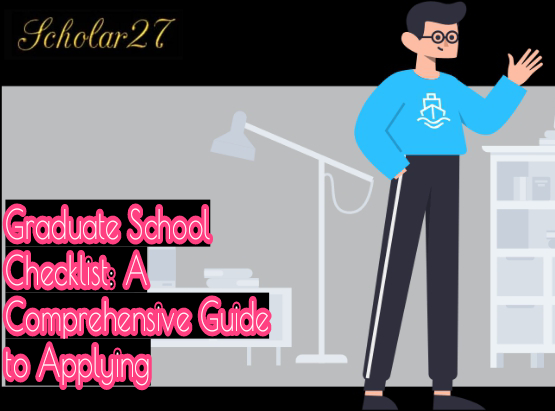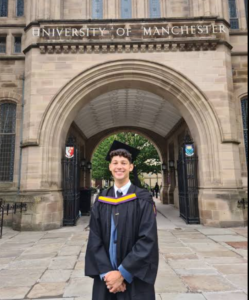
Graduate School Checklist: A Comprehensive Guide to Applying
Are you considering pursuing a graduate degree? Congratulations on taking this significant step in your academic and professional journey. Applying to graduate school can be a daunting task, but with the right guidance, you can navigate the process with ease.
In post, we will provide a detailed checklist to help you prepare and submit a strong application to your chosen graduate programs. We will cover everything from international passports to reference letters, so buckle up and let’s get started.
International Passport
Before you begin your graduate school journey, make sure you have a valid international passport. This may seem obvious, but it’s essential to ensure your passport is up to date and won’t expire soon. So,
- Check the expiration date of your passport and renew it if necessary.
- Ensure your passport has at least two blank pages for visa stamps.
- Make a photocopy of your passport and keep it in a safe place.
Transcript
Your transcript is a crucial document that showcases your academic achievements. Here’s what you need to do:
- Request official transcripts from all previous academic institutions, including undergraduate and graduate degrees, community college or transfer credits, and study abroad programs.
- Ensure your transcript includes your name and student ID number, institution name and logo, course names and grades, and degree earned and date of completion.
- If your transcript is not in English, provide a certified translation.
- Check with your institution to see if they offer electronic transcripts or if they need to be mailed.
Personal Statement/Statement of Purpose/Letter of Intent
Your personal statement is an opportunity to showcase your goals, motivations, and experiences. Here’s how to craft a compelling statement:
- Write a well-structured and compelling statement (usually 1-2 pages) outlining your academic background and interests, career goals and motivation, reasons for choosing the specific graduate program, and relevant skills and experiences.
- Tailor your statement to each program you’re applying to.
- Use specific examples and anecdotes to illustrate your points.
- Edit and proofread your statement multiple times.
Academic CV
Your academic CV is a document that highlights your academic achievements, research experiences, and relevant skills. Here’s how to create a strong CV:
- Update your CV to highlight academic achievements and awards, research experiences and publications, relevant work experience and skills, and volunteer and extracurricular activities.
- Use a clear and concise format, with bullet points and white space.
- Tailor your CV to each program you’re applying to.
- Include relevant sections such as education, research experience, work experience, skills, and awards and honors.
Research Proposal (if applicable)
If you are applying to a research-based program, you’ll need to develop a research proposal. Here’s what you need to do:
- Develop a detailed proposal (usually 2-3 pages) outlining your research question and objectives, methodology and approach, and significance and potential impact.
- Consult with your potential supervisor or academic advisors.
- Ensure your proposal aligns with the program’s research focus.
IELTS/GRE/TOEFL
Language proficiency exams are required for most graduate programs. Here’s what you need to do:
- Check the language proficiency requirements for your chosen programs.
- Register and prepare for the required exam (IELTS, GRE, or TOEFL).
- Ensure you meet the minimum score requirements.
- Prepare for the exam by studying and reviewing material, taking practice tests, and getting tutoring or coaching.
Application Fees (if applicable)
Some graduate programs require application fees. Here’s what you need to do:
- Check if the programs you’re applying to require application fees.
- Pay the fees promptly to avoid delays in processing your application.
- Check if you’re eligible for fee waivers or discounts.
Reference Letters
Reference letters are an essential part of your graduate school application. Here’s how to go about it:
- Identify potential referees who can speak to your academic and professional abilities.
- Request letters of recommendation well in advance (at least 2-3 months).
- Provide your referees with information about the programs you’re applying to.
- Ensure your referees know the deadlines and requirements.
- Follow up with your referees to ensure they submit the letters on time.
Additional Tips
We have handpicked some additional tips to help you navigate the graduate school application process:
- Start your application process early to avoid last-minute stress.
- Use a spreadsheet or task list to keep track of the requirements and deadlines for each program.
- Regularly update your checklist to ensure you’re on pace to meet the application deadlines.
- Don’t hesitate to seek guidance from academic advisors or mentors if needed.
- Proofread and edit your application materials multiple times.
Conclusion
Applying to graduate school can be a daunting task, but with the right guidance, you can submit a strong application. Remember to start early, stay organized, and seek guidance when needed.
Good luck on your graduate school journey.

















Post Comment